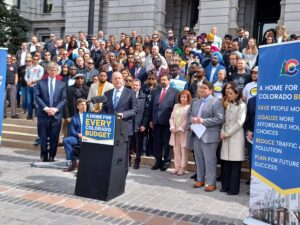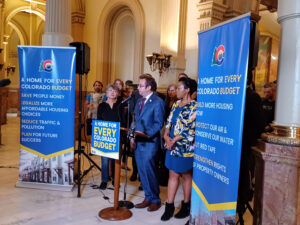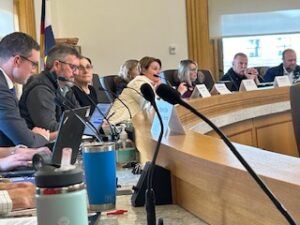Gov. Jared Polis is pushing Colorado’s recently formed Commission on Property Tax to study potential adoption of an obscure taxation system used in less than two dozen U.S. cities that he believes could spur construction of new housing and improvement to existing buildings.
The land value tax is a system where property taxes are assessed only upon the land that someone owns and not based upon the value of the buildings on that land. Proponents of what also is called the “Georgist” system of property taxation — named after its most prominent early American proponent, late 19th-century author Henry George — argue that it can spur more efficient use of urban property and incentivize building upon it.
If that theorem sounds like it meshes with the Democratic governor’s land-use and affordable-housing aspirations — essentially, boosting the stock of existing housing, particularly in the multifamily space, to bring down sky-high housing costs through competition — it does. When the Legislature reconvenes for its 2024 session on Wednesday, Polis and his legislative allies will push a package of bills seeking to incentivize and, in some cases, use mandates to boost housing density in urban areas to spur greater development of residences.
What Polis is asking
The governor said in a Jan. 5 letter to members of the property-tax commission, formed by a bill passed in the November special session to study long-term solutions to the state’s volatile property-tax system, that a land value tax would help achieve another of his goals. Assessing property values based on the land rather than on the quality of construction on them will bring down property taxes for a good many people, he argued.
“Taxing land — not the buildings on top of it — also has the benefit of reducing land speculation and promoting environmentally sound development,” Polis wrote to commission members on the same day it heard a presentation on the land value tax from two economists. “In contrast, taxing buildings discourages investing in your home — including adding an Accessory Dwelling Unit, for example — adds costs to expanding your business and leads to increased rents.”

Gov. Jared Polis rolled out his affordable-housing bills at a news conference at the Capitol on March 22, 2023.
Polis and legislators from both parties are scrambling to offer property-tax relief after home valuations statewide rose by an average of 40% during the 2021-23 cycle, leading to a similarly sized boost in property-tax bills that homeowners must pay this year. While commercial buildings didn’t experience a similar across-the-board skyrocketing of values, most are looking at higher property-tax bills too at a time when office buildings in urban centers deal with significant vacancy rates.
At their Friday meeting, the 19 appointed commission members outlined the outcomes they hoped to achieve, with many similar themes coming from a group that includes county commissioners, legislators, assessors and business and education leaders. Many said they hope to create more stability in property-tax bases as well as sustainability of revenues that allow local governments and school districts, the primary beneficiaries of the taxes, to provide adequate services.
Little interest so far in land value tax
Dead last in survey of commissioners’ priorities was the idea of creating a land value tax system — an idea added for the commission’s consideration only because of an amendment by Rep. Steven Woodrow, D-Denver, to the bill that created the body. But it’s becoming clear that the idea has one prominent supporter in Polis.

Colorado state Rep. Steven Woodrow speaks at a news conference in May about the land-use reform bill he cosponsored in 2023.
Such a tax, which considers only the value of the underlying land, is used by about 20 municipalities in Pennsylvania but nowhere else in the United States, said Steve Hoskins, an economist with the Robert Schalkenbach Foundation of New Jersey. Employed in various ways by several European countries, the idea is gaining a slight measure of prominence in America because Detroit’s mayor is considering it as a potential way to spur property owners to build structures in a city scarred by abandoned and crumbling buildings.
Currently in Denver, buildings and improvements to land typically represent a little more than 50% of the assessed value of the property, explained Luke Teater, a former chief economist for Polis’ budget office who now serves as principal of Thrive Economics. Switching to a land-value tax would stop tax bills from rising when building owners improve their properties and could remove any disincentives that now keep people with vacant properties from fixing them up or from, say, adding more stories of housing to multifamily properties.
“Taxing improvements means you get less improvements,” Teater told the commission. “We have a very large housing shortage, and I believe at least part of that is because we have this disincentive for improving land.”
How a land value tax would change property assessments
Under a land-value system, properties would derive their values from the demand for the land, meaning that areas in popular parts of cities and near amenities such as transit and parks would generate the highest assessments, Teater said. Land with high-dollar buildings like downtown Denver skyscrapers likely would generate lower assessments than it generates now, while largely undeveloped land, such as downtown parking lots, likely would be subject to higher property-tax bills, he explained.
The state could not switch over to a land-value system entirely, as areas like agricultural land would have to be exempted from such a system to remove incentives for owners to pull up their crops and build on them instead, Teater explained. But Colorado could look at allowing cities to opt into such a system if done in a revenue-neutral way, or it could create assessment subtypes that separate the land and the buildings upon it, he said.
The idea met with a significant amount of skepticism and questions at the Friday meeting.

Members of the Commission on Property Tax ask questions during its initial meeting in December.
“Looks good in a vacuum”
Realtor Sean Doughrety, for example, pushed back on Hoskins’ assertion that Pittsburgh’s creation of land-value districts in the 1970s helped that city to redevelop, saying that there were several investment factors that had far greater impact. And state Sen. Mark Baisley, R-Woodland Park, questioned exactly where people would park in a city like Denver if the tax system incentivized multi-story buildings on every block.
“This looks good in a vacuum,” argued Alamosa County Commissioner Lori Laske, saying that such a plan doesn’t consider the many drawbacks that could come from it.
Still, it’s notable that Polis’ first direct communication to the commission was an effort to give more heft to an idea that hadn’t cropped up in discussion before the letter arrived.
What happens next
It’s unclear yet if Polis will be able to round up more support in 2024 for his land-use reform ideas, which ran into intense opposition last year from local governments balking at his ideas to take away some of local leaders’ ability to have the final word on zoning and planning decisions. But it’s clear from his letter to commissioners that he believes he can simultaneously pitch ideas such as the addition of accessory dwelling units with his promotion of a land value tax system.
Polis suggested in the letter that the easiest way to implement such a system is adoption of “building exemptions” in which officials reduce assessment rates specifically for residential, commercial or other buildings before the overall property assessment rate is applied.
“I recommend you consider this promising economic concept which has the potential to significantly boost investment and growth while cutting taxes for all,” he wrote.
The commission will meet next on Jan. 19. It must produce recommendations for the Legislature by March 15.
